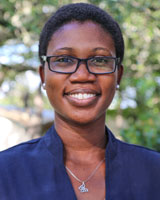By: Dr. Awa Jangha
The Black Religious Scholars Group (BRSG) and Their Impact on a Young Black Faculty Member
In 2018, the first BRSG visiting professor came to begin what would be a five-year eye-opening experience for the education, culture, and community of the seminary. This experience was also a foundation of support for my own professional identity development. The 2018-2019 academic year marked the third year of my role as a junior faculty member. The start of that year was marked by the death of my father which also coincided with the year that I took on new administrative responsibility. Needless to say, it was a time of growth for me as I navigated grief, learned new organizational and leadership skills, and engaged in routine responsibilities of teaching and advising. The abundance of newness that I had to navigate paralleled the beginning of our BRSG program.
That first year, having another Black faculty member on campus, by sheer presence alone, provided me with a sense of grounding that grew and blossomed into joy as the kindness, intelligence, and gift of the first scholar, Dr. Melanie Jones, blessed me. This is true for every scholar thereafter. I learned from each one (Dr. Melanie Jones, Dr. Cheryl Kirk-Duggan, Professor Yolanda Norton, Dr. Brandon Crowley, and Dr. Stephen Ray) how to be more myself, letting my culture shine within my work and growing into the strength of my voice. I will be forever grateful for this program and the gifts that each remarkable person brought to the community at large, but even more so, for the gift I personally received in witnessing their authenticity and kindness.
The wisdom shared to junior faculty of color over the past five years from BRSG scholars has been both intentional and vital. What was poured into me regarding time, interest, encouragement, and curiosity has fostered growth in who I am as a professional today. BRSG scholars supported me through both challenging and joyous moments. They took the time to see me and encourage me as a Black faculty member and as a Black woman, normalizing experiences of faculty of color and sharing wisdom from their professional journeys along with dreams for their next steps. This inspired me to reflect, to dream, and to seek out additional support available for Black faculty (being a part of a Wabash cohort was fruit of that inspiration).
The timespan of 2018-2023 also included the experience of the COVID-19 pandemic where racial tension and injustice were also center stage. Having BRSG scholars as fellow persons to process the personal impact of what occurred during that time with other faculty of color and with the faculty at large was life-giving. The simplicity of having space to laugh or nonverbally communicate reactions to issues that involved Black culture was another gift mutually shared.
The support across these years, the interest and support in my work, the encouragement of my growth, and the care for how I was doing personally made each BRSG scholar feel more like friends than colleagues. This care allowed me to bring more of my whole self to the work that I do. This care supported me in speaking up more to advocate for others and share my own views, when by nature I typically prefer to be in the background. This care was an example of how I might do the same for others. This care also inspired me to think bigger than I had before and begin to dream and imagine wider possibilities of the impact of my work. Witnessing the wonderful work and ministry of each BRSG scholar gave me a glimpse of the impact one could make.
I believe it is important to highlight that their impact on me was over and above their work of teaching in the Master of Divinity program. They welcomed my curiosity about their subjects of expertise and inquired about mine. The support I felt came from community created within check-ins and conversations at lunch or events. I make note of this because this exceeded the work of a visiting scholar. Investing in another’s life is reflective of mentorship, wanting the best for one another, and creating a space where one can genuinely express oneself.
The program also prompted community wide conversation around race, oppression, and justice that did find its way into the counseling program. Creative collaboration for ways to grow in our commitment to social justice as faculty and staff contributed to fostering conversations and similar collaboration with students when considering advocacy, justice, and diversity within the counseling curriculum.
Carrying the collaborative work of the BRSG scholars forward includes maintaining a commitment to sustain the work we have started as a community, within each program, and individually. It also includes utilizing and encouraging the uplifting of each other’s voice. I personally carry the charge to pay it forward and engage in providing the same lifegiving encouragement, care, and mentorship to others.
I feel immeasurably thankful to have had a span of my formative years from a junior faculty into a senior faculty member with the support, guidance, and wisdom of each BRSG scholar. I know in my soul that my professional journey has been shaped by the gifts of who each BRSG scholar is and express my deepest gratitude.
Reflection questions:
When have you felt inspired by someone you look up to and how have they shaped your formation? In what ways have you seen yourself grow? If given the opportunity, how would you express your gratitude?
This fall, Sowing Holy Questions reflects on the personal and professional impacts of the Black Religious Scholars Group Visiting Professor partnership of the past five years.


